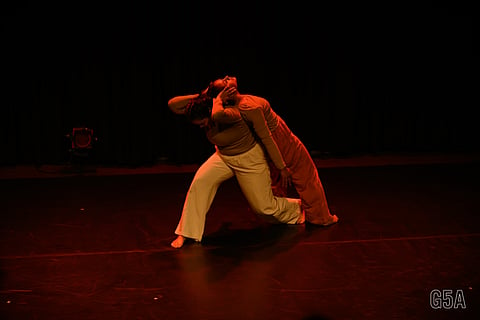
- LIFESTYLE
- FASHION
- FOOD
- ENTERTAINMENT
- EVENTS
- CULTURE
- VIDEOS
- WEB STORIES
- GALLERIES
- GADGETS
- CAR & BIKE
- SOCIETY
- TRAVEL
- NORTH EAST
- INDULGE CONNECT

Mumbai-based dancer and choreographer Shruti Datar presents her new performance, C-Tactile: Tracing Touch, which explores the many meanings of touch — comfort, power, memory and resistance. Drawing from personal experiences, research and physical exploration, the piece delves into how touch shapes our relationships, bodies and movements in everyday urban life. Shruti lets us in on the idea behind the perfor mance, how she chose to approach the theme choreographically and lots more…
Shruti, your upcoming performance in Bengaluru is titled C-Tactile: Tracing Touch. What sparked the idea for this work?
I was drawn to the contradictions within the idea of touch. It can be a gesture of intimacy or comfort, but it can also be used to assert dominance. I wanted to explore these contradictions, especially from the perspective of navigating urban life as a woman — how our bodies are often conditioned to either avoid or initiate touch. From there, I expanded it to include personal, social and political nuances of touch.
Touch is such a layered theme. How did you choose to approach it choreographically?
This piece is rooted in a research paper I developed as part of a fellowship I received from KCC in Kolkata. As someone trained in bharatanatyam, touch was never really explored in classical settings. But in contemporary dance, physical contact becomes central — though I wasn’t always comfortable with it. So, the research paralleled my own questions: how do men and women experience touch differently? How does it shape our physicality and daily performance of actions? I avoided codified movement and instead built the piece through contemporary idioms, journaling, personal memories and studio explorations.
The work also explores memory, power and resistance through touch. How do these ideas manifest in movement?
We found that touch evokes memories — it can trigger sensations deeply stored in the body. We also explored touch as a language: if we couldn’t use words, how would touch communicate intention, relationship or power dynamics? These ideas emerged during workshops I conducted as part of my research. In a socio-political context like India, touch — or the avoidance of it — can also reflect hierarchy. We tried to translate this into movement: how does the absence or denial of touch assert dominance? These layers became physical inquiries.
What was it like working with Melita Dsouza as a movement collaborator?
Melita and I both work in Mumbai, where it’s tough to sustain as independent artistes. We’ve collaborated before and share a similar approach to movement and contemporary dance. It’s been fruitful not only because of our alignment, but because she also challenges my ideas and brings her own perspective. That balance really shaped the work.
Since the performance deals with a sensitive theme, how do you navigate vulnerability during rehearsals and on stage?
That was very important to me. Although we’ve performed this piece in different stages of development — first as a 10-minute draft, then 20 — I’ve always been mindful of not imposing physical trauma onto the performers’ bodies. The work invites vulnerability, but I didn’t want to retraumatise anyone, especially since we’re dealing with topics like consent and invasive touch. The space had to remain safe for the performers. Vulnerability, for us, is about evoking emotion and memory without crossing into harmful territory.
Your work subtly critiques societal hierarchies. Do you view it as a form of activism?
I see my work as a way to start conversations. While policy is what truly drives change, I believe dance can hold up a mirror to society. My aim is to make people reflect, physically and emotionally. I’m interested in the structures that shape us and while I may not have the power to dismantle them, I can certainly question them.
Do you see C-Tactile evolving further or being adapted into other formats?
Yes, definitely. Right now, we have two core performers and two understudies. The Bengaluru performance will feature an understudy instead of Melita. I’d love to expand it into a four-person ensemble. I’m also curious about how the work might shift with a male performer involved. The intention isn’t to exclude men — these conversations must include everyone. If given time, funding and the right context, I’d love to see how the piece could grow and take on new layers.
INR 350. April 11, 7 pm. At Medai — The Stage Bengaluru, Koramangala.
Email: alwin@newindianexpress.com
X: @al_ben_so